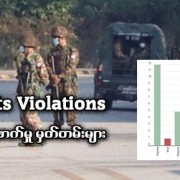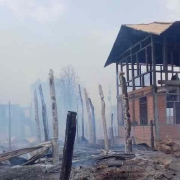30,000 civilians trapped by conflict in Myanmar’s Lashio
Tens of thousands have already fled the town in Shan state amid fighting between Kokang rebels and the military.
Around 30,000 civilians are trapped in the largest town in northeastern Myanmar’s Shan state amid intensified fighting between the military and ethnic Kokang rebels, residents and aid workers said Thursday.
The Myanmar National Democratic Alliance Army, or MNDAA, is part of an alliance of three ethnic minority insurgent forces known as the Three Brotherhood Alliance. The alliance launched an offensive last October, codenamed Operation 1027 for the date it began, and pushed back junta forces in several regions.
After a five-month ceasefire ended on June 25, the MNDAA and allied forces attacked junta camps in Madaya, Singu and Mogoke townships in Mandalay region, and Hsipaw, Kyaukme, Nawnghkio and Lashio towns in Shan state to the east.
MNDAA forces began targeting military outposts in Lashio – a town with a population of just over 130,000 – on July 3, and more than 50,000 people have since fled their homes amid heavy shelling that caused civilian casualties, residents told RFA Burmese.
But some 30,000 residents remain trapped in the town, mostly because they lack the financial wherewithal to escape, they said.
“With children, we do not have enough money to flee from the armed conflict,” said one resident who, like others interviewed for this report, spoke on condition of anonymity due to security concerns. “So, we … must keep living inside the town. It is also expensive to rent a car to flee.”
The resident added that Lashio is dealing with a scarcity of commodities and rising prices, while shops are closing daily.
A 100-year-old man in Lashio told RFA that he couldn’t leave the town because of injuries to his head and leg caused by shelling. He now depends on food supplies from relief groups, he said.
“I have received food from relief groups as most shops in Lashio are closed,” he said. “[Junta] airstrikes took place yesterday. All the houses near the [military’s] Light Infantry Battalion No. 507 headquarters were completely destroyed.”
The elderly resident said that three of his neighbors were killed by heavy weapons fire and had to be buried in a trench.
According to Lashio residents and relief groups, around 30 civilians were killed and another 30 were injured by artillery attacks from July 3-17.
In need of aid
A relief worker in Lashio confirmed to RFA that many people are trapped in the town because they can’t afford to abandon their homes, while those who have taken refuge in nearby towns are facing various difficulties.
“Many people want to leave the town, but they have no money,” said the worker, noting that most are trying to reach Myanmar’s second largest city Mandalay, 280 kilometers (175 miles) to the southeast, or southern Shan state’s capital Taunggyi, 345 kilometers (215 miles) to the south.
“They are trying to sell their motorcycles to cover the cost of moving to other areas.”
The relief worker noted that many of his colleagues had already left Lashio amid the fighting, although a contingent was trying to return from neighboring Hsipaw township to assist trapped residents.
Of the more than 50,000 residents who have already fled, many have relocated to Kutkai, Nam Lan, Taunggyi, Mandalay, and the commercial capital Yangon, a displaced resident who made his way to Taunggyi told RFA. However, some have been trapped en route, while others are now destitute in their towns of refuge.
“We fled our homes without enough money, and we expect to face many problems in the long run,” he said. “We have no jobs or income in these other towns.”
The Lashio resident said that rent is on the rise in Taunggyi, due to the rising number of internally displaced persons, or IDPs, arriving in town.
Attempts by RFA to contact MNDAA spokesperson Li Kyar Win and the junta’s Shan state spokesperson and economic minister Khun Thein Maung for updates on the conflict, went unanswered Thursday.
The MNDAA announced on Tuesday that it had arrested 32 junta soldiers, including a deputy company commander, during fighting near Lashio.
Translated by Aung Khin. Edited by Joshua Lipes and Malcolm Foster.








